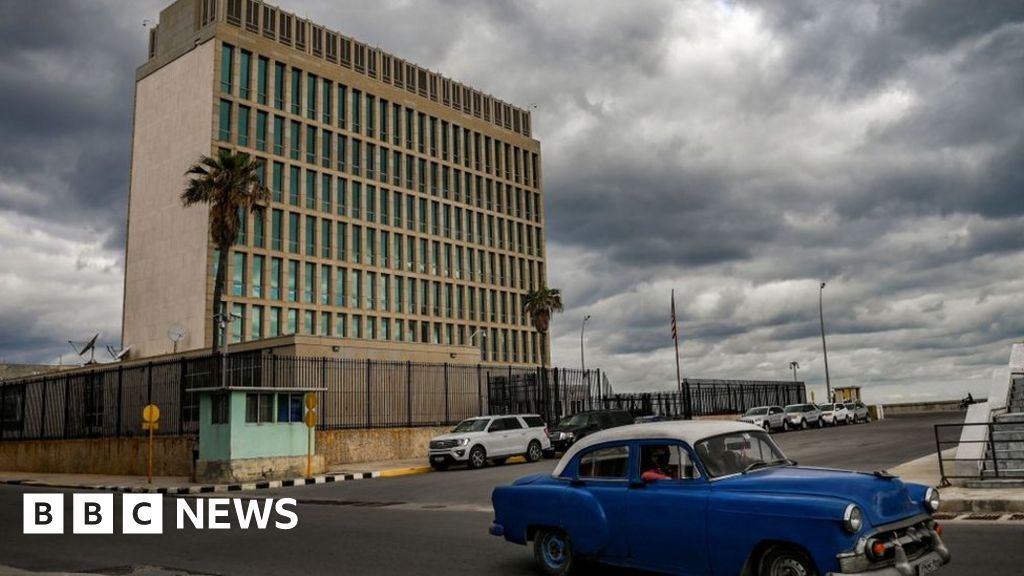
- Written by James Fitzgerald
- BBC News
Image source, Getty Images
This syndrome was first reported by diplomats at the US Embassy in Cuba in 2016.
A mysterious illness that has afflicted American diplomats in recent years has been linked to a Russian intelligence unit.
Individuals stationed around the world suffering from “Havana Syndrome” have reported unexplained symptoms such as dizziness.
They may have been targeted by Russian sonic weapons, according to a joint investigation conducted by them The insiderDer Spiegel and 60 Minutes on CBS.
Moscow denied these accusations. US officials previously said a foreign power was unlikely to bear responsibility.
But in their assessment of “anomalous health incidents” – delivered last year – they offered no alternative explanation, frustrating those affected.
US officials also acknowledged that there were varying levels of confidence in the assessment between the various intelligence agencies involved.
The phenomenon gets its name from the Cuban capital, Havana – where the first case was detected in 2016 – although the new report suggests the first cases may have occurred in Germany two years earlier.
Other cases have been reported around the world, from Washington to China.
American employees with the condition, including White House, CIA, and FBI employees, have complained of dizziness, headaches, difficulty concentrating, and a shrill, painful sound in their ears.
More than 1,000 reports have been submitted of the mysterious illness, and dozens of cases are still officially considered unexplained. US lawmakers passed legislation aimed at supporting victims.
However, a National Institutes of Health (NIH) study published last month said MRI scans failed to detect evidence of brain injuries in dozens of US employees who reported symptoms of encephalitis.
There have long been suspicions that those affected may have been exposed to directed energy or microwaves launched from hidden devices – a possibility that was acknowledged in an earlier US intelligence report.
The new media investigation claims that members of a specific Russian military intelligence unit — known as 29155 — may have targeted the brains of American diplomats with “directed energy” weapons.
It says there is evidence that unit members were present in cities around the world at times when US personnel reported incidents.
The secret unit handles foreign operations and has been linked to incidents including the attempted poisoning of Sergei Skripal, a former Russian spy, in the United Kingdom in 2018.
As part of the investigation, The Insider – a website focused on Russia – reported that an officer in Unit 29155 was rewarded for his work related to developing “non-lethal sonic weapons.”
A US military investigator studying cases of the syndrome told 60 Minutes that the common link among victims of the syndrome was a “Russian bond.”
“There was an angle where they worked against Russia, focused on it, and did a very good job,” Greg Edgren explained.
He also said that official US evidence proving Russia's involvement was too high, because his country did not want to “face some very difficult facts.”
In response to the media investigation, Kremlin spokesman Dmitry Peskov said: “No one has published or expressed any convincing evidence of these baseless accusations anywhere. Therefore, all of these are nothing more than baseless accusations.”
One of the victims of the syndrome, an FBI agent, told 60 Minutes her experience when she was subjected to a violent attack in her home in Florida in 2021.
“Bam, inside my right ear, it was like a dentist practicing on steroids,” she told the programme. “That feeling when it gets too close to the eardrum? It is, 10 times.”
The woman, known as Carrie, said she eventually lost consciousness and later suffered memory and concentration problems.
In response to the report, US officials told CBS News, the BBC's US partner, that they would “continue to closely examine anomalous health incidents”, but reiterated their position that it was “unlikely that a foreign adversary was responsible”.
But they said they “did not question the real experiences and symptoms reported by our colleagues and their family members,” saying their work on such incidents was a priority.

“Travel specialist. Typical social media scholar. Friend of animals everywhere. Freelance zombie ninja. Twitter buff.”





More Stories
Taiwan is preparing to face strong Typhoon Kung-ri
Israel orders residents of Baalbek, eastern Lebanon, to evacuate
Zelensky: North Korean forces are pushing the war with Russia “beyond the borders”